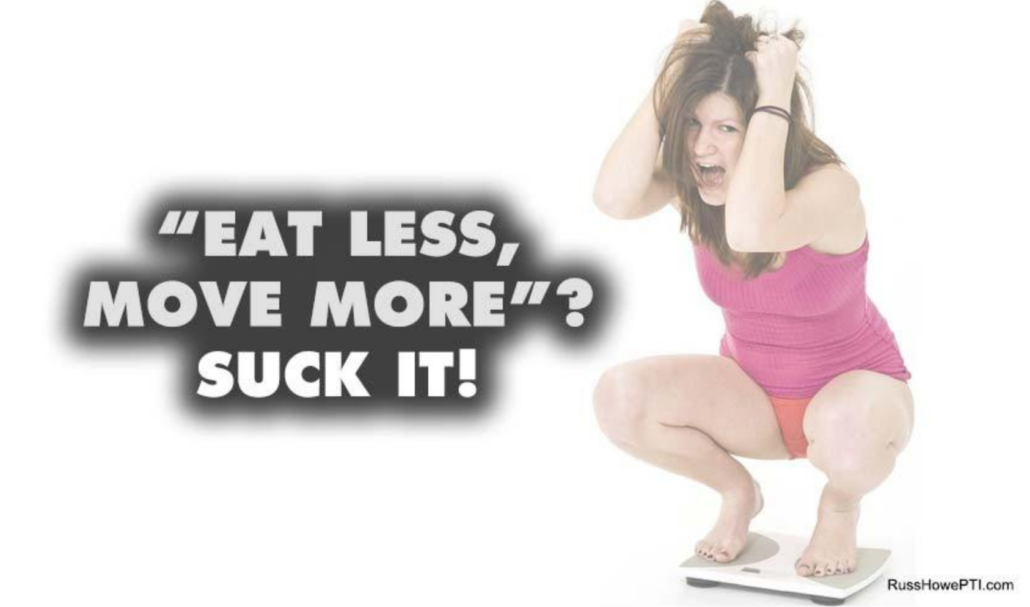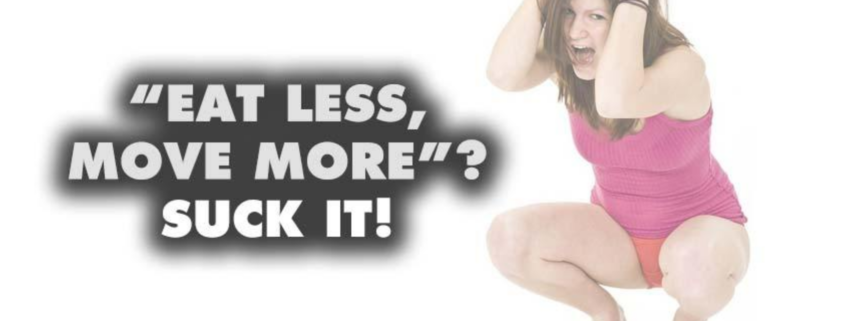The Lie Of “Eat Less, Move more” For Weight Loss
We’ve all heard it, thought it, said it, and even believed it. At some level it is the undeniable truth, because after all, energy cannot be created or destroyed, so therefore we are what we consume, less what we burn.
BUT, we are not bomb calorimeters (devices used for precisely determining the amount of energy in organic matter). We are living, breathing, dynamic organisms with thousands of interdependent biological processes going all the time. As human beings we are similar but different, with different genetics, stresses, nutritional statuses, base health challenges, and lives. Calories in vs. calories out as a formula for body weight, becomes an incredibly complex algorithm complicated by other factors such as inflammation, fluid retention, and unexcreted waste.
When you really stop to think about it, it becomes obvious how ridiculous the one-size-fits-all advice of “eat less move more” is. Sometimes that IS exactly what is required as a first rung approach—I’m not saying that that it’s necessarily bad advice, but what about when it doesn’t work? For many who attempt it, it feels like personal failure is the problem. –That they are weak, undisciplined, broken, genetically or karmically destined to be overweight… And then they feel worse, adding an unceasing source of stress and unhappiness to an already stressed system.
And we’ve all heard it; sometimes with best of intentions, other times with disgust, condescension, or incomprehension. Unless you have lived it, it is hard to fathom that what works for you will not necessarily work for the next guy (or gal). But it is always hurtful and damaging to assert your judgments onto others because the meaning is that if only you would wake up and do what needs to be done (stop being a lazy pig) that your life would be better.
Allow me to assure you that calories-in v. calories-out, is just not a workable solution for everyone, and here’s why:
To start with, let’s note that some people get more or less energy out of the food they eat based on a number of factors including the makeup of the gut biome, genetics, and ability to digest, synthesize, and assimilate certain things. So calories-in is already an objectively suspect part of what’s supposed to be a predictable formula. Next, exercising burns calories, but it’s calories burned over a 7/24 timeline that matters more than how much is burned in an hour or so per 24 or 48-hour period. Muscle burns calories, fat does not. So it is base metabolic rate and amount of lean muscle mass that matters more than “exercise.”
Next let’s look at stress because everything comes back to stress anyway.
Stress, form a biological standpoint, is your body’s non-thinking way of monitoring safety and survivability. Metabolic output gets adjusted accordingly through chemical and hormonal messaging happening 24/7 to assure your survival in the worst circumstances. It is your body’s way of making sure precious resources don’t get used up too quickly—which was very handy in times of war, famine, and scarcity. It’s not so handy in the stressful land of plenty we live in because the stress triggers tell us we want to acquire and preserve all of the resources we possibly can just in case… So metabolic function slows, yet desire to eat (accumulate more resources) does not diminish, and if anything it increases in a properly functioning organism.
Hormones, our chemical messengers, are an interconnected system that includes cortisol, blood sugar regulation, thyroid function, sex hormones, cholesterol, etc. When one system is stressed or disrupted the others are affected too. Chronic stress can exhaust your adrenal glands to the point they no longer function properly, which means all of your hormonal systems are chronically stressed.
Stress comes in all sorts of forms beyond the typical demanding job, challenging relationships, traffic, financial worries, etc. that everyone would agree is “STRESS”. Stress can be physical, environmental, mental, and emotional. It can be sudden traumas, illness, frequent blood sugar ups and downs, chemical exposures, extremes of heat and cold, grief, or a broken heart… Some of the more subtle forms of stress include things like feeling out of integrity with yourself, not feeling like you’re living your life-purpose, or feeling like you have lost yourself in your own life. Stress can be as a result of not eating enough, or skipping meals, which your body interprets that as scarcity, which equals stress. You might take up running, or join a gym—but biologically you may as well be running from a tiger because exercise, can in fact, be interpreted as stress in an already stressed body.
We are lucky here in America to have such “first world problems,” but regardless, stress is stress and it can undermine all of your best efforts.
Nutritional deficiencies add to the challenges of energy production. Making energy is kind of like baking a cake—when you run out of the right ingredients (nutrients)—no cake—or no energy as the case may be, and trying to get through life with no energy is even more stressful! It is surprising how commonly nutritional factors play in to weight loss resistance. For those who have spent years trying to “eat less” and grit through the stress, nutritional repletion tends to be low, which basically means the energy making cupboard is bare.
Better advice than “eat less, move more” would be:
- Eat 3 nutritious meals per day at regular intervals
- Drink plenty of plain water throughout the day
- Sleep well, and for at least 7 hours per night–8 is better!
- Move your body regularly in ways you enjoy
- Seek out and eliminate sources of stress in your life to what ever degree possible. (Your life is yours, make it a good one!)
- Seek professional help to help you where you feel stuck
- Don’t beat yourself up over anything–it is just not helpful!
In short, be kind to yourself. If eating less and moving more doesn’t work for you—or it feels like an uphill struggle, slow down, consider what else may be going on. Maybe lack of will and determination is not the problem. Maybe there are other factors at play that you have not considered—ones that could be addressed effectively with out any pain or suffering. If it doesn’t work for you it doesn’t mean you’re weak, or broken, or hopeless; it just means that is not the path for you, or maybe at least, not for right now.



Leave a Reply
Want to join the discussion?Feel free to contribute!